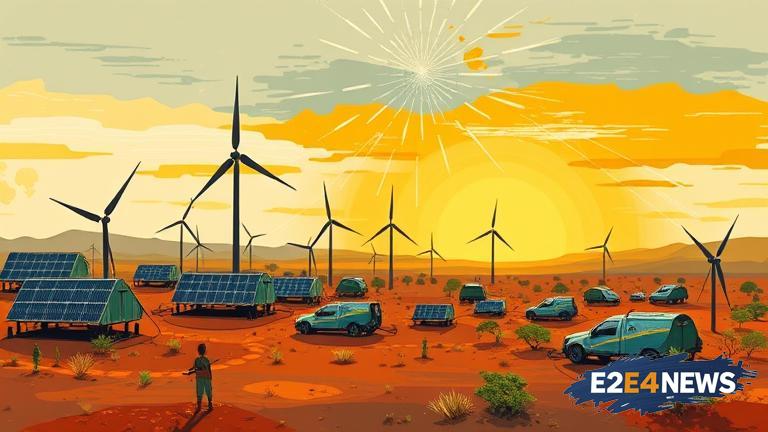The African continent is witnessing a significant shift towards renewable energy, driven by the need to address the pressing issues of energy access, climate change, and sustainable development. With many countries still struggling to provide reliable and affordable electricity to their citizens, renewable energy has emerged as a viable solution. Solar and wind power are becoming increasingly popular, with many African nations investing heavily in these sectors. For instance, South Africa has set ambitious targets to increase its renewable energy capacity, aiming to generate 20% of its electricity from renewable sources by 2030. Similarly, Morocco has made significant strides in developing its solar energy sector, with the launch of the Noor-Ouarzazate solar power plant, one of the largest in the world. Other countries, such as Egypt, Kenya, and Ghana, are also making notable progress in the renewable energy sector. The African Union’s Agenda 2063 has set a target of ensuring universal access to clean and affordable energy by 2030, which has further accelerated the adoption of renewable energy across the continent. The use of renewable energy is not only helping to reduce greenhouse gas emissions but also creating new job opportunities and stimulating local economies. Moreover, the cost of renewable energy is decreasing, making it more competitive with fossil fuels. The International Renewable Energy Agency (IRENA) has reported that the cost of solar energy has fallen by over 70% in the last decade, making it more accessible to African countries. Furthermore, the African Development Bank has launched several initiatives to support the development of renewable energy in Africa, including the creation of a $500 million fund to support renewable energy projects. The bank has also partnered with the International Solar Alliance to promote the use of solar energy in Africa. In addition, many international organizations, such as the World Bank and the European Union, are providing financial and technical support to African countries to help them develop their renewable energy sectors. The private sector is also playing a crucial role in the development of renewable energy in Africa, with many companies investing in solar and wind power projects. For example, the Norwegian company, Scatec Solar, has invested in several solar power projects in Africa, including a 400-megawatt solar power plant in Egypt. The use of renewable energy is also helping to improve energy access in rural areas, where many communities lack access to reliable and affordable electricity. Mini-grids and off-grid solar systems are being used to provide energy to these communities, improving their quality of life and enabling them to access basic services such as healthcare and education. However, despite the progress made, there are still significant challenges to be addressed, including the lack of infrastructure, limited access to financing, and the need for policy and regulatory frameworks to support the development of renewable energy. To overcome these challenges, African countries need to work together to create a favorable business environment, develop the necessary infrastructure, and provide training and capacity-building programs to support the growth of the renewable energy sector. In conclusion, the renewable energy revolution in Africa is gaining momentum, driven by the need to address the pressing issues of energy access, climate change, and sustainable development. With the right policies, investments, and partnerships, Africa can become a leader in the global renewable energy market, providing clean and affordable energy to its citizens and driving economic growth and development.
